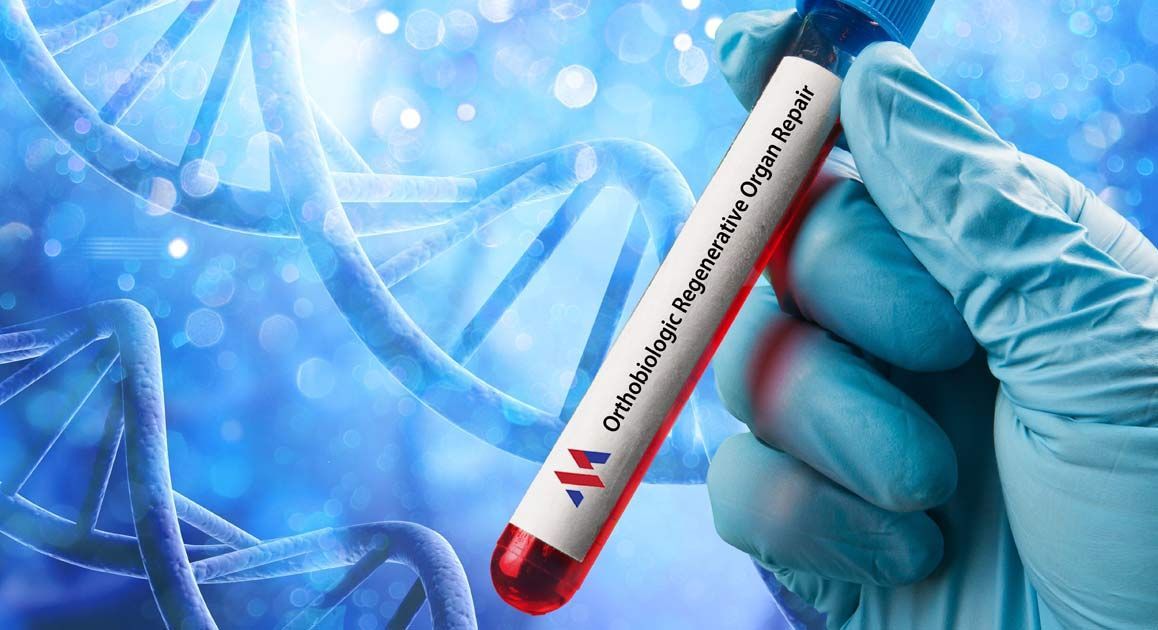Organ Repair Treatments NJ and NYC - Victory Medical Institute

Advanced Regenerative Organ Therapy is a Breakthrough in Healing and Restoration Serving Patients in Morris Plains New Jersey and Manhattan New York
What is Regenerative Organ Repair?
Regenerative Organ Repair is an innovative medical approach focused on restoring damaged organs by stimulating the body’s natural healing processes. It leverages advanced medical technologies, such as Orthobiologics, to enhance tissue regeneration and repair. Unlike traditional treatments that mainly manage symptoms, regenerative therapies aim for long-lasting results by addressing the underlying causes of organ damage. This process can help revitalize impaired organs, giving patients improved organ function and relief from chronic ailments. These are not FDA approved treatments, but the research below shows the potential applications of these therapies.
Regenerative Organ Repair is particularly beneficial for those with degenerative diseases, injuries, or previously considered irreversible conditions. By supporting the body’s natural ability to repair itself, these therapies bring hope to those with limited options. With extensive research validating its benefits, this cutting-edge treatment is revolutionizing how the medical world approaches organ repair.

Clinical Research for Regenerative Organ Repairs
Ongoing clinical trials are essential for assessing the long-term effectiveness and safety of Orthobiologic therapies in regenerative medicine. The less invasive nature of these treatments often appeals to patients seeking alternatives to traditional surgical interventions. However, it is vital to consider individual patient factors, including age and overall health, which can influence treatment outcomes. Education about the potential benefits and limitations of orthobiologics is important for informed patient decision-making.
Orthobiologic therapy represents a cutting-edge approach to regenerative organ repair, focusing on harnessing the body’s innate healing abilities. By leveraging advanced biological agents, practitioners aim to provide sustainable solutions for patients with damaged organs, enhancing quality of life and overall health. With continued research and development, the future of orthobiologics in regenerative therapy looks promising, offering new hope for patients with previously limited treatment options.
Orthobiologic Regenerative Organs That Can Be Repaired
- Skin - Stem cells have shown remarkable results in wound healing, burns, and diabetic ulcers. A notable study demonstrated that applying mesenchymal stem cells (MSCs) accelerated the healing of diabetic foot ulcers significantly faster than conventional treatments, promoting rapid tissue regeneration and minimizing scarring.
- Heart - Stem cells have successfully improved outcomes for heart disease and acute myocardial infarction (heart attack). Clinical trials have indicated MSC therapy significantly improves cardiac function, reduces mortality, and aids heart tissue regeneration after heart attacks.
- Lungs - For chronic obstructive pulmonary disease (COPD), MSC therapy has demonstrated long-term benefits. In one notable case, a patient experienced sustained improvements in breathing capacity and reduced oxygen dependency over seven years following stem cell treatment.
- Brain - Stem cells have significant potential in treating neurodegenerative diseases such as Parkinson’s and Alzheimer’s. A pioneering case in Sweden reported successful transplantation of embryonic stem cells into a Parkinson’s patient, significantly improving motor function and quality of life.
- Kidneys - Mesenchymal stem cells have demonstrated effectiveness in improving kidney function in patients with chronic kidney disease (CKD), helping to reduce inflammation and promote regeneration of renal tissues.
- Liver - MSC therapy has improved liver function in patients with liver cirrhosis, significantly reducing disease severity and enhancing quality of life.
- Joints and Cartilage - Stem cells significantly relieve pain and improve joint function in patients with osteoarthritis by regenerating damaged cartilage, thus delaying or even eliminating the need for surgical intervention.
- Intestines (Crohn’s Disease) - Stem cells effectively treated severe Crohn’s disease in patients previously unresponsive to conventional therapies, significantly reducing symptoms and promoting mucosal healing.
- Pancreas (Diabetes) - Stem cell therapy has enabled patients with type 1 diabetes to regain insulin production, offering groundbreaking treatment possibilities to reverse diabetes progression.
- Immune System (Autoimmune Diseases)
- Stem cells have successfully treated autoimmune diseases like rheumatoid arthritis and lupus, significantly reducing inflammation, joint destruction, and autoimmune activity, improving patient outcomes, and reducing reliance on immunosuppressive medication.
What Can Happen If These Conditions Are Left Untreated
If conditions such as chronic wounds, heart disease, lung disorders, neurodegenerative diseases, kidney problems, liver cirrhosis, joint deterioration, inflammatory bowel diseases, type 1 diabetes, and autoimmune diseases are left untreated, the repercussions can be severe and life-altering. For instance, untreated diabetic ulcers can lead to serious infections, possibly resulting in amputations and the necessity for long-term care. In the realm of heart disease, failure to address deteriorating cardiac function can culminate in heart failure, increased mortality rates, and significant declines in the overall quality of life. Similarly, neglecting lung conditions like COPD can result in shortness of breath and increased dependence on supplemental oxygen, severely impacting daily activities and overall well-being.
When it comes to neurodegenerative diseases such as Parkinson’s and Alzheimer’s, the absence of treatment can accelerate the decline in cognitive and motor function, leading to increased dependence on caregivers and a diminished quality of life. Chronic kidney disease, if untreated, can progress to renal failure, necessitating dialysis or transplantation, drastically altering a patient’s life. Liver cirrhosis can lead to life-threatening complications, including liver failure and severe systemic health issues. In the context of painful joint conditions like osteoarthritis, untreated degeneration can lead to chronic pain, loss of mobility, and the need for major surgical procedures.
Additionally, ignoring the symptoms of Crohn’s disease can exacerbate inflammation and lead to significant gastrointestinal complications, while untreated type 1 diabetes can drastically impact health, leading to severe complications such as organ damage. Autoimmune diseases can further deteriorate patients’ health if left unmanaged, leading to systemic damage and increasing the likelihood of requiring aggressive treatments in the future. Overall, untreated conditions not only aggravate individual health issues but also impose significant burdens on healthcare systems and caregivers, emphasizing the critical importance of timely intervention.
Case Studies For Regenerative Organ Repair Treatments
- A 65-year-old patient with a long history of poorly managed diabetes developed a diabetic ulcer on her foot, which she ignored for months due to a belief that it would heal on its own. As time passed, the ulcer became infected, leading to sepsis, which necessitated an emergency hospitalization and ultimately resulted in an amputation of part of her foot. Simultaneously, this patient had a history of heart disease that went untreated, resulting in progressive heart failure. As her cardiac function deteriorated, she experienced increased fatigue and shortness of breath, severely limiting her ability to engage in daily activities and significantly impacting her overall quality of life.
- In another case, a 72-year-old man exhibited symptoms of early-stage Alzheimer’s disease, which were overlooked as normal aging, leading to a rapid decline in his cognitive abilities and increased reliance on his family for support. His untreated neurodegenerative condition progressed to a stage where he no longer recognized family members, creating emotional distress for both him and his loved ones. Coinciding with his Alzheimer’s, the man experienced joint pain from osteoarthritis that went untreated, leading to chronic pain and difficulties in mobility. Consequently, he required physical therapy and consideration for joint replacement surgery to manage his symptoms.
- Concurrently, a 30-year-old woman with Crohn’s disease ignored her gastrointestinal symptoms for years, which led to severe complications, including bowel obstruction and malnutrition. Similarly, a 40-year-old man with an untreated autoimmune disorder faced systemic issues that required aggressive treatment after a series of debilitating flare-ups. These cases highlight the grave consequences of neglecting timely medical intervention, stressing the need for proactive healthcare to prevent irreversible damage and enhance quality of life.
- A 55-year-old male patient diagnosed with chronic liver disease due to hepatitis C underwent Orthobiologic therapy as a potential treatment for regenerative organ repair. After a thorough evaluation, the patient was selected for a clinical trial using adipose-derived orthobiologics. Following the extraction of adipose tissue, the cells were processed to concentrate the orthobiologics before being injected into the affected areas of the liver. Post-treatment assessments included imaging studies and liver function tests, which marked improved liver enzyme levels and overall function. The patient reported significantly reduced symptoms, including fatigue and abdominal discomfort. Over six months, he experienced enhanced energy levels and an improved quality of life. Follow-up biopsies revealed a reduction in fibrosis, indicating that the therapy might have promoted tissue regeneration and repair within the liver. The response to treatment demonstrated the potential of orthobiologics in stimulating the healing process in organs with limited regenerative capabilities. This case highlights the importance of personalized treatment plans and the role of regenerative medicine in addressing chronic organ damage.
Choosing Victory Medical Institute of NJ for Orthobiologic Treatments
Victory Medical Institute is a leader in delivering advanced regenerative therapies with proven expertise in Orthobiologic treatments. Our team of professionals includes highly trained physicians who stay updated on the latest advancements in regenerative medicine. With years of experience treating patients with complex conditions, we are committed to providing personalized solutions that address your specific health challenges.
Every patient receives a tailored treatment plan designed to maximize the potential for healing and recovery. Victory Medical Institute prides itself on maintaining the highest standards of care, ensuring safety and effectiveness in every procedure we perform. We strive to deliver a superior experience and life-changing results from state-of-the-art facilities to compassionate medical staff.

Contact Victory Medical Institute NJ and Manhattan NY for a Regenerative Organ Treatment Consultation
At Victory Medical Institute, our mission is to help you regain health and vitality through innovative Regenerative Organ Repair treatments. If you’re ready to explore how Orthobiologics can improve your quality of life, our expert team guides you every step of the way. Many of our patients have experienced remarkable recoveries and newfound hope, and now, it’s your turn. Please schedule a consultation with us to learn more about how our personalized treatment plans can meet your unique needs. Your path to better health starts today—contact us to take the first step.
Please contact us today.

